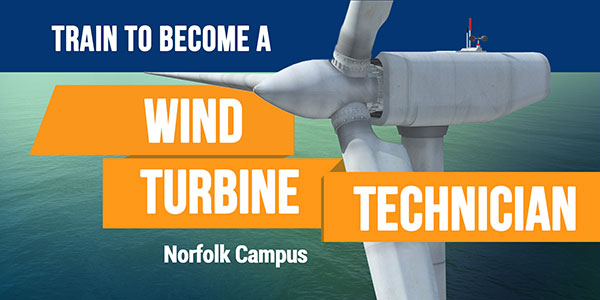Why Become A Wind Turbine Technician?
The United States is actively committing itself to renewable energy. Wind turbines and the electric energy systems they power are a big part of this transformation. As the industry grows, many skilled workers will be needed. A large boom of jobs is expected to follow as wind energy initiatives are launched. Several of the jobs created will be for wind turbine techs.

How Do Wind Turbines Work?
By now, most of us have seen the large, pinwheel-shaped wind turbines that dot the landscape in different regions. These devices convert wind energy into electricity with the help of three major components:
- Towers to reach the right altitude for wind capture.
- Triple-bladed propellers to capture the wind.
- Central nacelle, which houses the turbine’s generator, gearbox, and brakes to transform the propeller’s movement into electricity.
Wind turbine service technicians, or “wind techs” for short, provide technical support to keep these devices running. Their employers task them to perform installations, inspections, servicing, and repairs. A tech’s main job is to prevent breakdowns. They also need to be able to spot and fix mechanical, electrical, and hydraulic problems as they happen.
Maintenance and Repairs
Maintenance for turbines involves both scheduled and unscheduled servicing. Most turbines receive maintenance one to three times a year. How often a turbine is serviced is determined by manufacturer recommendations and the number of operating hours per turbine. Common maintenance procedures include inspecting all components and lubricating moving parts.
Repairs are a little different. Power companies closely monitor all wind turbines around the clock. If problems are spotted, they will dispatch one or more wind techs to troubleshoot the problem. Any problems found are repaired immediately.
Wind Turbine Technician Job Duties
Generally, a wind turbine tech needs many skills. They must be able to install, maintain, and repair all wind turbine components. Specific tasks include:
- Inspecting wind turbine exteriors.
- Ensuring physical integrity of towers.
- Working with large cranes.
- Climbing wind turbine towers to access equipment.
- Performing routine upkeep.
- Testing and troubleshooting all components and systems.
- Collecting relevant turbine data for testing and/or analysis.
- Replacing damaged or broken system components.
- Servicing underground transmission systems connected with the turbines.
A wind turbine tech may be tasked to build new turbines. However, most will perform maintenance and repairs. Many work within the casing of the nacelle. This task requires expert knowledge. Technicians can learn what they need to know through training programs offered at trade schools like Centura College throughout the country.
Wind Turbine Tech Work Environment
To work in the nacelle, wind turbine technicians must be comfortable with heights. This job requires them to climb and stand hundreds of feet above ground. To stay safe, proper protective gear must be worn, including a full body harness that attaches to the nacelle. While in the nacelle, wind techs use diagnostic computers and a range of hand and power tools. Environmental conditions include:
- Traveling to secluded fields where wind farms are located.
- Working in largely undeveloped and rugged regions.
- Being assigned to work at sea at offshore sites.
Although a wind turbine tech can conduct solo work, they often work with one or more other techs. Some jobs will require them to work with electricians and/or other specialists.
Wind Turbine Technician Work Schedule
Typically, most techs work full time. They also might be placed “on call” to handle evening and weekend emergencies. Wind turbine repair is often time sensitive, so techs must usually agree to flexible work schedules as employers want to make certain problematic issues that arise are promptly addressed.
Job Aptitude
Wind turbine technicians generally spend their days outdoors, working in confined spaces hundreds of feet above the ground or sea. As work environments are unlike most jobs, techs must be comfortable working in these conditions:
- Cannot have a fear of heights or restricted spaces.
- Must have strong mechanical skills.
- Possess the ability to climb ladders as high as 260 feet.
- Be able to carry equipment weighing as much as 45 pounds.
In short, those with a fear of heights or restricted spaces will probably find this is not the right job to pursue.
Salary and Employment Outlook
The industry is expected to grow at a rate of 61% through 2029. In fact, the employment outlook for wind turbine technicians exceeds the average for all occupations. While Virginia has not previously been a big player in the wind turbine field, this is quickly changing. The Virginia Clean Economy Act of 2020 requires Virginia to be 100% carbon-free by 2045:
Depending on a person’s training and experience, wind turbine technicians can make an average annual salary of $56,700.

- VA-based Dominion Energy is constructing a two-turbine project 27 miles off Virginia’s coast. Construction should be completed within a few years. This is projected to add 900 wind turbine technician jobs once finished.
- FieldCore, a GE company, is currently building turbines in Richmond, VA.
- Virginia Business reports offshore wind projects may add 5,200 jobs in the Commonwealth with many in Hampton Roads in the coming years.
This law prioritizes offshore wind power. Simply put, coal is out, wind is in.
Additional East Coast offshore wind projects are also planned. Future jobs will be found from North Carolina to Massachusetts. Many of these may be linked to Virginia-based hubs.
How to Become a Wind Turbine Technician
The majority of wind turbine technicians learn their trade by completing a training program at a college or technical school such as Centura College. Wind turbine technicians also often complete internships. Some unions and individual contractors also offer hands-on apprenticeship programs. These opportunities give techs extensive on-the-job training.
At Centura College, the Wind Turbine Technician program provides the opportunity to learn everything needed to become a successful technician. The program also offers the chance to complete Maritime based certification(s), the National Center for Construction Education & Research (NCCER) Introduction to Power Industry and Wind Turbine Maintenance Level I certification(s), and CPR/Basic Life Support. The program can be completed in as little as 12 months.
About Centura College
Centura College has been part of an organization dedicated to helping men and women develop careers since 1969. By training working adults in healthcare, technology, business, and trades, they connect communities with some of the fastest growing career fields in today’s marketplace. The school offers professional facilities, knowledgeable instructors, day or evening classes, job placement assistance and is accredited by the Accrediting Commission of Career Schools and Colleges (ACCSC). To learn more, visit www.CenturaCollege.edu or like them on Facebook at https://www.facebook.com/centura.edu


